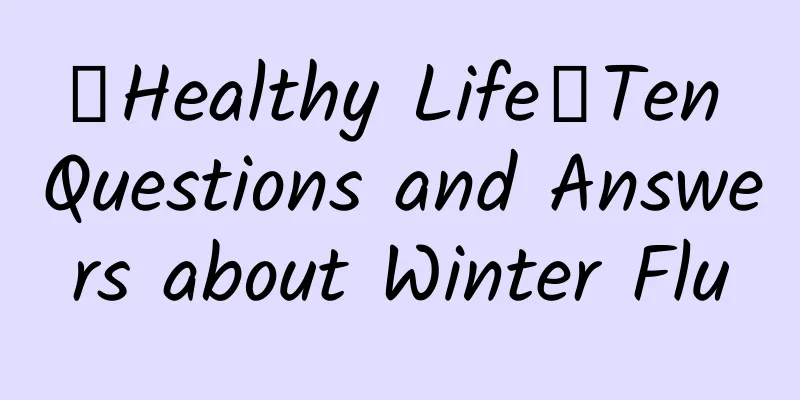【Healthy Life】Ten Questions and Answers about Winter Flu

|
Flu strikes How do we respond? Autumn and winter are the peak seasons for respiratory infectious diseases. With the sudden change in weather, influenza will also enter its peak period. Recently, the number of patients seeking medical treatment for influenza has gradually increased. So how can we effectively reduce infection? What should we do if we get influenza? Ten questions and ten answers will explain it to you. "Ten Questions and Answers about Flu" 01 Know yourself and know your enemy. Is influenza a serious cold? Flu is the abbreviation of influenza, an acute respiratory infectious disease caused by influenza virus infection, mainly including four types: A, B, C, and D. The disease is seasonal and prevalent every year, with influenza A and B viruses being the main ones. The common cold is also caused by viral infection, and there are many types of viruses, including rhinovirus, adenovirus, respiratory syncytial virus, coronavirus, etc. Compared with the common cold, influenza has a more obvious seasonality, is more contagious, has a wider range of prevalence, more severe symptoms, and more complications. 02 Is winter the influenza season? Is there a flu epidemic every winter? Every October, various parts of my country enter the winter and spring influenza epidemic season. Not necessarily. Influenza can cause global pandemics, seasonal epidemics, local outbreaks, and sporadic outbreaks. 03 How is influenza transmitted? Influenza viruses are mainly transmitted through droplets such as sneezing and coughing. They can also be transmitted through direct or indirect contact with the mouth, nose, eyes, etc., or through aerosols in closed places. 04 Is a fever in winter the flu? What are the symptoms of flu? uncertain. The main symptoms of influenza include fever, headache, muscle pain, sore throat, and dry cough, which are called flu-like symptoms. 05 Do I need to go to the hospital for examination and treatment if I have flu symptoms? Most influenza is self-limiting, which means it can be relieved on its own, usually within 3-5 days, the fever will subside, and the cough and fatigue will gradually improve. However, for some special groups such as children, the elderly, pregnant women, obese people, patients with underlying diseases such as heart, brain, lung, liver and kidney, and patients with worsening symptoms, it is recommended to go to the hospital for examination and treatment as soon as possible. 06 What are the complications of influenza? Pneumonia is the most common, and others include nervous system damage, heart damage, myocarditis, rhabdomyolysis, shock, etc. 07 How is influenza diagnosed? If flu-like symptoms occur, use the rapid influenza virus detection method: ① Influenza antigen detection, which can detect both influenza A and influenza B; ② Influenza nucleic acid detection, which has higher sensitivity and specificity and can distinguish subtypes. 08 How to treat influenza? Is there a specific medicine? Symptomatic supportive treatment and anti-influenza virus treatment. Currently, there are effective anti-influenza virus drugs, commonly used oral oseltamivir, mabaloxavir, and arbidol, which can reduce complications within 2-3 days of early onset. These drugs should not be used indiscriminately and must be taken under the guidance of a doctor. 09 How to prevent influenza? (1) Get an influenza vaccine every year: This is recommended for the elderly, children, pregnant women, patients with chronic diseases, students, medical staff, etc. (2) Drug prevention: Use antiviral drugs within 48 hours after contact with an influenza patient. (3) General prevention: Keep fit and maintain good personal hygiene habits. 10 When should I get the flu vaccine? What vaccines are there? Can pregnant women, children, and people with weakened immune systems be vaccinated? It is recommended to get the influenza vaccine before the end of October every year and it needs to be vaccinated every year. The influenza vaccines approved for marketing in my country include trivalent inactivated vaccine, quadrivalent inactivated vaccine, and trivalent live attenuated vaccine. Pregnant women can be vaccinated with inactivated influenza vaccine throughout their pregnancy; children over 6 months old can be vaccinated; people with severe immunodeficiency should not be vaccinated with inactivated vaccine because they cannot produce protective antibodies, and live attenuated vaccine should not be used because it may cause disease. It is recommended that their family members or caregivers be vaccinated. Rumors about influenza in the world (Rumors are being debunked) 01 "I have the flu, I just need some antibiotics!" Antimicrobial drugs are ineffective in treating and preventing influenza. Influenza is mostly self-limiting and can be relieved on its own. Mild cases of influenza can be relieved through symptomatic supportive treatment (such as reducing fever and cough, adequate rest, etc.). Flu will not be cured just because you take effective antibiotics. Influenza can also lead to secondary bacterial infection. At this time, you should see a doctor and let a specialist determine whether antibiotics are needed and which antibiotics are appropriate. Do not take antibiotics indiscriminately on your own. Antimicrobial drugs are drugs that specifically inhibit and destroy bacteria. Using antimicrobial drugs to treat viral infections is ineffective and may even be harmful because they may cause bacteria to develop drug resistance, making it more difficult to treat bacterial infections. 02 "If I drink more hot water, the flu won't invade me!" Drinking plenty of water is indeed a good habit, but drinking plenty of water every day cannot prevent the flu. Don't believe this kind of news in the circle of friends! 03 "If you've had the flu this year, you won't get it again!" Unlike the flu and measles, you are not immune to it after you have had it once. If you are not careful, you may get it again. |
<<: Premature ovarian failure makes girls older! Are your ovaries still young?
>>: Plant-based foods, are they just a waste of money or are they really good for your health?
Recommend
How to reduce the fever of a pregnant woman with a fever of 39 degrees
Pregnant women must take good care of their bodie...
Is medical abortion painful?
When a woman is pregnant for a certain period of ...
Postpartum pelvic repair exercises
After ten months of pregnancy, once a woman gives...
Are there many people suffering from vulvar leukoplakia?
Vulvar leukoplakia is a very common gynecological...
What medicine should I take to eliminate uterine fibroids?
The cause of uterine fibroids is still not very c...
What causes vaginal bleeding?
It is normal to have bleeding in the stool in lif...
How long does it take for bleeding from polyps to disappear during pregnancy?
Many women suffer from some less serious gynecolo...
What should women do if they have pain in the right lower back?
As the Internet continues to penetrate into peopl...
Are vaginal tightening exercises effective for vaginal health care?
In modern society, more and more women want to be...
How to tie a gauze waist belt
After giving birth, women will have particularly ...
Why do women have frequent urination and the urge to urinate after giving birth?
Women will encounter many symptoms of physical di...
Effect of general anesthesia for cesarean section on fetal intelligence
Most women who have caesarean sections choose par...
How long does it take to get your period after induced abortion?
Induced abortion is very harmful to the female bo...
How to quickly regain your figure after giving birth
During pregnancy, in order to replenish the nutri...








![[Fat Bear Science] Are cancer patients prone to malnutrition? These 7 tips can help a lot](/upload/images/67f1e8626ad55.webp)
